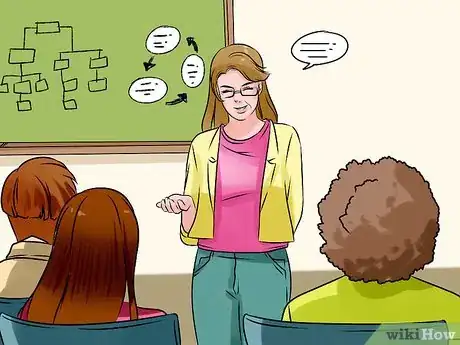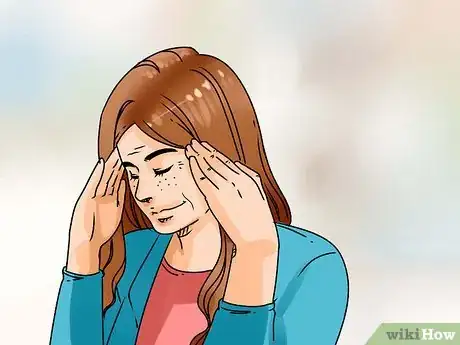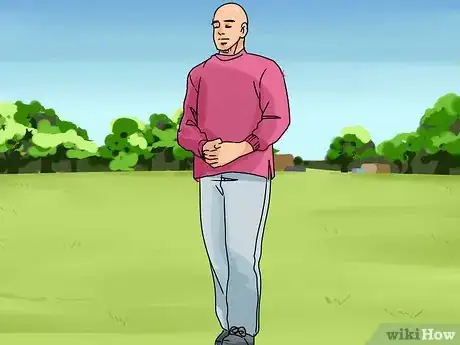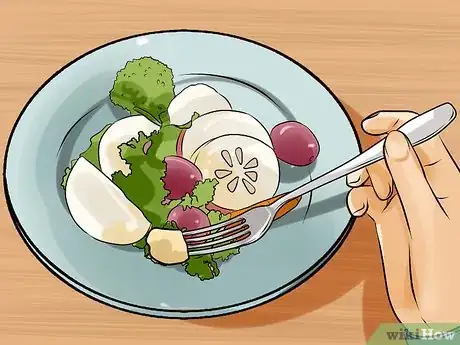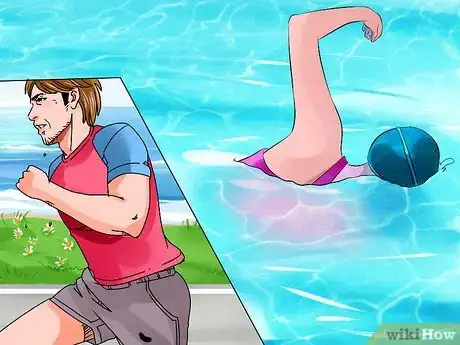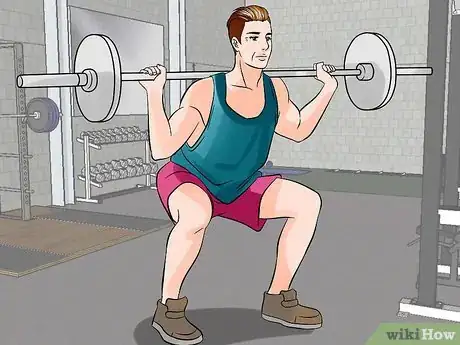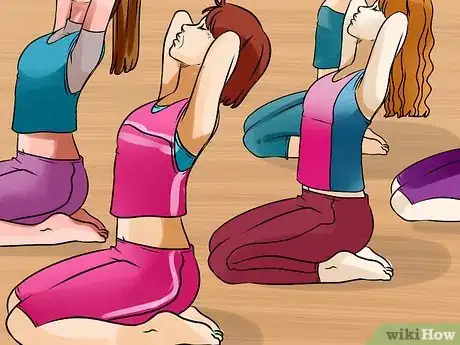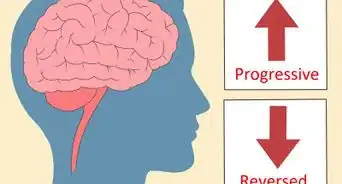This article was co-authored by Babis Kanellopoulos. Babis Kanellopoulos is a Personal Trainer and the Owner of Pod Fitness in London, UK. Babis specializes in helping clients use fitness to overcome difficulties and gain self-confidence. He has experience in kickboxing, long distance running, and martial arts. Pod Fitness sessions combine the focus of personal training with the benefits of small group, personalized, and structured training.
This article has been viewed 107,497 times.
Research shows that people who feel younger than their chronological age are likely to live longer, better lives. While no one knows the single best way to stay young, there are three qualities that people who feel young tend to have in common. Keeping your mind agile, your body active, and staying socially active are all ways that people feel younger than they are.
Steps
Maintaining a Young Mindset
-
1Challenge yourself to try new things. Go out dancing, joining a book club or a hiking club, or try out for a community chorus. Singing, dancing, and finding new ways to stay active all contribute towards keeping a youthful outlook on life.[1]
- Don't be afraid to laugh at yourself.
- Trying new things with joyfulness raises your levels of dopamine and energy levels.
- Listening to music raises your dopamine, as does dancing.
-
2Take an educational class. Local community colleges are full of courses that you can take to learn new skills, or brush up on subjects you have not have thought about in a while. For a small cost, you can join other lifelong learners and keep your mind active.[2]
- If you're able to, consider joining an educational travel tour. These tours are offered by a variety of different organizations, and are a wonderful way to travel and learn at once.
- Taking classes is a wonderful way to meet new friends, another way to keep your mind active.
Advertisement -
3Learn to be mindful. Being mindful means to live in the present moment. Bringing your attention to the present moment has been shown to be connected to lower levels of stress, maintaining cognitive flexibility, and overall good health.[3]
- Try to include mindfulness practices, such as meditation, in your daily routine. Even as little as 10-15 minutes of meditation per day has been connected to improvements in mental and physical health.
- Bring mindfulness practices to your daily activities. Eating intentionally, in a relaxed and thoughtful way, is tied to better digestion and health.
-
4Try walking meditation. Walking meditation is simply bringing mindfulness practices to the ordinary activity of walking. It is not the aerobic exercise that brings the benefits of a brisk walk, but a meditative activity that centers the mind and calms the nervous system. You can do this anywhere, but for best results find a place to walk where you will not encounter people to talk to or obstacles that may distract you from your meditation.[4]
- To practice walking meditation, start by being aware of your physical body as you stand. Feel the way your feet connect to the ground, and the way the air feels against your skin.
- Walk forward at a gentle pace. Continue to notice the way your body feels as you move.
- Breathe through your nostrils, maintaining awareness of the feeling of your breath flowing through your nostrils and into your lungs.
- Come to a stop, and notice how it feels to cease movement.
- Repeat this exercise until your attention wanders. Over time you'll develop the ability to practice this meditation for longer periods of time.
-
5Focus on something larger than yourself. People who have a connection with something larger than themselves are more likely to be resilient. You might try spending time mentoring young people, or participating in a spiritual group. Simply connecting with people who are important to you will also help you feel like a part of something larger than yourself.[5]
- When you focus only on yourself and your needs, you're more likely to have trouble with the aging process.
- Participating in a larger group will help bring a sense of meaning and purpose to your life.
- You're more likely to feel important to other people when you're active in their lives.
-
6Eat a healthy, balanced diet. If you feel young, you're more likely to want to eat foods that will keep you healthy in the future. To stay young, you have to believe that you have a future! A diet that includes plenty of fresh fruits and vegetables, lean protein, and plenty of fiber will help you feel better.
- Avoid heavy drinking, overeating sugar, trans and saturated fats.
- Increase the amount of good fats, whole grains, and Omega 3s for optimal health.
Staying Physically Fit
-
1Keep moving. People who spend at least 150 minutes a week engaged in aerobic exercise experience benefits in their physical health. They also have better mental health, less likely to experience depression and anxiety, and have better cognitive skills.[6]
- One way to fulfill your weekly exercise commitment is to engage in moderate activity for 30 minutes, 5 days a week.
- Follow your body's comfort level with exercise. Check with your doctor before starting a new exercise program.
- If you like animals, consider volunteering as a dog walker for your local animal rescue organization.
-
2Do strength exercises. In addition to your weekly commitment of 150 minutes, it's important to work your muscles. Strength exercises build muscle mass, help your muscles process energy more efficiently, and strengthen bones. Strength exercises are generally measured in repetitions rather then in lengths of time.[7]
- Strength exercises are often done using gym equipment, which aids in weight lifting. However, you can also do heavy gardening (such as working with a shovel) or carrying heavy household items.
- Exercises that use your own body as a weight, such as sit-ups or push-ups, are also considered strength exercises.
-
3Take a yoga class. Research suggests that an hour of yoga reduces the risk of heart attacks and strokes. Yoga also improves blood pressure and cholesterol. There are many kinds of yoga; talk to your doctor to find a yoga class that will work with your body.
- If you have physical limitations, look for an adapted yoga class which is designed for yoga practitioners with limited mobility.
- Most yoga classes allow individual adaptation based on each person's need.
- Yoga might be a good option for people who are unable to engage in more strenuous forms of exercise.
-
4Sign up for a dance class. Dancing is good for people who are at danger of falls due to weak legs or balance issues. Dancing will improve your sense of balance and help prevent broken bones from falls. Ball room and line dancing are moderately active exercises for most people.[8]
- Yoga and tai chi can also help improve your balance.
- You should be able to talk while engaged in moderate activity, though you shouldn't have enough breath to sing or shout.
- Joining a fitness class of any kind is also a great way to socialize and make new friends.
Keeping an Active Social Life
-
1Strengthen ties with your family and friends. Many people who report feeling younger than their age report spending time with people they care about. Make special outings with your family and friends a priority in your life. Try scheduling dinners, shopping trips, or just meeting for coffee.[9]
- By focusing on the lives of your family and friends, you're less likely to feel isolated and alone.
- If you live close to your family, consider scheduling "family time" as a regular part of every day.
- Schedule "game nights" with your friends, or join them for club meetings or events.
-
2Volunteer to help someone. People who feel young usually report feeling as if they have something to offer their communities. As a result, they feel valued and appreciated.Local schools, hospitals, and community groups are great places to volunteer.[10]
- Consider volunteering to take meals through organizations such as Meals-on-Wheels, or tutoring a young person in academic skills.
- Retired business people might volunteer for SCORE which mentors fledgling business owners.
-
3Find groups that share your interests. If you enjoy reading, consider joining a book group at your local library or bookstore. If you speak a second language, many times there are conversational groups that meet in the community. Other options include movie groups, religious communities, or craft groups.[11]
- If you've never had the opportunity to explore your interests, visit groups and ask questions of its members. People are usually quite happy to talk about their hobbies.
- If you can't find a group centered around your interests, consider finding like-minded people online.
-
4Connect with people online. While connecting with people online isn't the same as spending time with them in person, social groups online are increasingly popular among people of all ages. In addition, this can be a wonderful way to connect with distant family members and friends who you don't get to see often.[12]
- Learn to use social media, and share pictures and videos with your family and friends.
- Because younger people tend to be more fluent in using computers for social interaction, you'll likely feel younger simply by becoming familiar with online socializing.
Warnings
- Always check with your physician before starting a new exercise program.⧼thumbs_response⧽
References
- ↑ https://www.powerofpositivity.com/7-things-that-will-make-you-feel-younger/
- ↑ https://www.powerofpositivity.com/7-things-that-will-make-you-feel-younger/
- ↑ http://www.health.harvard.edu/blog/feeling-young-heart-may-help-live-longer-201412177598
- ↑ http://www.wildmind.org/walking/introduction
- ↑ http://www.health.harvard.edu/blog/feeling-young-heart-may-help-live-longer-201412177598
- ↑ http://www.health.harvard.edu/blog/feeling-young-heart-may-help-live-longer-201412177598
- ↑ http://www.nhs.uk/Livewell/fitness/Pages/physical-activity-guidelines-for-older-adults.aspx
- ↑ http://www.nhs.uk/Livewell/fitness/Pages/physical-activity-guidelines-for-older-adults.aspx
- ↑ http://www.nhs.uk/Conditions/stress-anxiety-depression/Pages/Connect-for-mental-wellbeing.aspx
About This Article
The best way to stay young is to take care of your body with regular exercise, including cardio activity and strength training. This can be weight training at a gym, exercises like sit-ups and push-ups, or even heavy gardening and lifting things around the house. It’s also a great idea to take a yoga class or dance class, and you can talk to your doctor for help finding a class that will work with your body if you have certain limitations. In addition to staying fit, take the time to maintain and strengthen your ties with close friends and family. People who spend more time socializing tend to report feeling younger than their age. For more tips on staying young, like maintaining a youthful mindset, keep reading!

